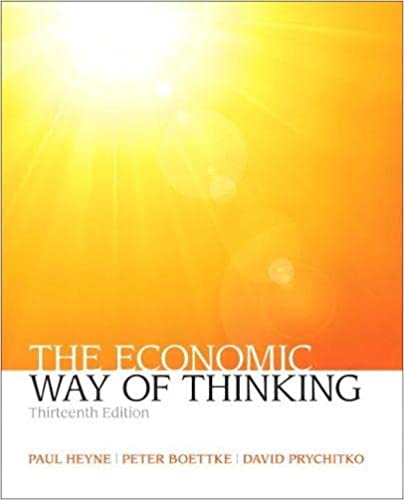
The Economic Way of Thinking 13th Edition by David Prychitko, Peter Boettke, Paul Heyne
Edition 13ISBN: 9780132992695
The Economic Way of Thinking 13th Edition by David Prychitko, Peter Boettke, Paul Heyne
Edition 13ISBN: 9780132992695 Exercise 15
If customers always want to purchase less at higher prices, why would any seller publicize the fact that its prices are high?
(a) The advertising slogan of Maker's Mark Whiskey is: "It tastes Expensive... and it is." Isn't the firm foolish to advertise its high price? Or will people buy more if they think Maker's Mark is more expensive than other whiskeys? If so, does this contradict the law of demand?
(b) A waiter at Jean-Louis, a restaurant in Washington, D.C., often patronized by eminent politicians, says: "It is good to be known as expensive. People know they can impress their guests here." What does he think people are purchasing when they go to Jean-Louis for dinner?
(c) Robert Cialdini reports the following event in his book Influence: The Psychology of Persuasion. The owner of an Arizona jewellery store was unable to move some fine-quality turquoise jewellery that was selling at low prices, in the height of the tourist season. So she instructed her assistant to cut the prices in half just before leaving on a business trip. But the assistant misunderstood and doubled the prices. When the owner returned a few days later, every piece had been sold. Can you explain this in a way that does not contradict the law of demand?
(a) The advertising slogan of Maker's Mark Whiskey is: "It tastes Expensive... and it is." Isn't the firm foolish to advertise its high price? Or will people buy more if they think Maker's Mark is more expensive than other whiskeys? If so, does this contradict the law of demand?
(b) A waiter at Jean-Louis, a restaurant in Washington, D.C., often patronized by eminent politicians, says: "It is good to be known as expensive. People know they can impress their guests here." What does he think people are purchasing when they go to Jean-Louis for dinner?
(c) Robert Cialdini reports the following event in his book Influence: The Psychology of Persuasion. The owner of an Arizona jewellery store was unable to move some fine-quality turquoise jewellery that was selling at low prices, in the height of the tourist season. So she instructed her assistant to cut the prices in half just before leaving on a business trip. But the assistant misunderstood and doubled the prices. When the owner returned a few days later, every piece had been sold. Can you explain this in a way that does not contradict the law of demand?
Explanation
he law of demand states that if everythi...
The Economic Way of Thinking 13th Edition by David Prychitko, Peter Boettke, Paul Heyne
Why don’t you like this exercise?
Other Minimum 8 character and maximum 255 character
Character 255


